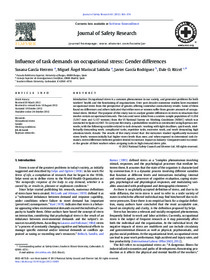Influence of task demands on occupational stress: gender differences

García Herrero, Susana ; Mariscal Saldaña, Miguel Angel ; García Rodriguez, Javier ; Ritzel, Dale O.
2012
43
5-6
365-374
gender ; psychosocial risks ; stress ; working conditions
Psychosocial risks
http://dx.doi.org/10.1016/j.jsr.2012.10.005
English
Bibliogr.
"Introduction: Occupational stress is a common phenomenon in our society, and generates problems for both workers' health and the functioning of organizations. Over past decades numerous studies have examined occupational stress from the perspective of gender, offering somewhat contradictory results. Some of them found no differences and others indicated that either men or women suffer from greater amounts of occupational stress.
Method: The purpose of this study was to analyze gender differences in stress in situations that involve certain occupational demands. The data used were taken from a random sample population of 11,054 (5,917 men and 5,137 women) from the VI National Survey on Working Conditions (NSWC) which was conducted in Spain in 2007. To carry out this study, a probabilistic model was constructed using Bayesian networks, with the following variables related to task demands: working with tight deadlines, quick work, intellectually demanding work, complicated tasks, repetitive tasks, excessive work, and work demanding high attention levels.
Results: The results of this study reveal that: the indicators studied significantly increased stress levels; women initially had higher stress levels than men; and when exposed to determined task demands, stress differences between genders tended to increase."
Digital
The ETUI is co-funded by the European Union. Views and opinions expressed are however those of the author(s) only and do not necessarily reflect those of the European Union or the ETUI.